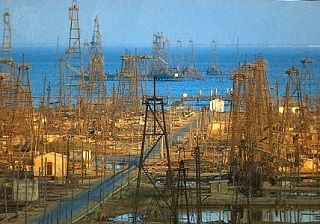Renewable Energy World, Azerbaijan, and the Harsh Truths of Realpolitik

Wow, glad I didn’t make a big deal out of that; it turns out that the author’s claim is quite likely to happen, just as it does a thousand miles or so to the south, where the oil-rich countries build solar and wind to provide the power they need themselves, enabling them to export as much oil and gas as possible to countries that do not “get it,” or, better said, to countries that, due to their political corruption and control by the oil companies, simply refuse to get it.
From the New York Times:
In 2006, Azerbaijan (pictured above) started pumping crude from its oil field under the Caspian Sea through the new Baku-Tbilisi-Ceyhan pipeline. Now, with the help of BP and other foreign energy companies, one million barrels of oil course through the pipeline daily, ending at a Turkish port on the northeastern corner of the Mediterranean Sea. This makes Azerbaijan a legitimate energy power (the world’s leading oil producer, Saudi Arabia, produces 11 million barrels every day) with a great deal of potential. If the proposed Nabucco pipeline, running from Turkey to Austria, is built, Azerbaijan would become a conduit for gas reserves, linking Central Asia to Europe. This could strip Russia, which sells the European Union more than a third of the gas it consumes, of one of its most potent foreign-policy levers. It could also generate billions of dollars every year for Azerbaijan, which between 2006 and 2008 had the world’s fastest-growing economy, at an average pace of 28 percent annually.…
These days, Azerbaijan, which is overwhelmingly Muslim, buys advanced weapons systems from Israel in return for oil. A new member of the United Nations Security Council, the country sided with the United States against Russia last year on a resolution condemning Syria. “This is a very small country on a very significant piece of real estate,” says Matthew Bryza, the former U.S. ambassador to Azerbaijan. “Azerbaijan pursues a very realpolitik policy.”
Unfortunately, a “realpolitik policy” is essentially in places everywhere that matters. I say “unfortunately,” because it means that fossil fuels will be with us as long as renewable energy solutions are even a tiny fraction more expensive.
I had a call after breakfast with a colleague who is working to develop a large wind energy farm with a compressed air energy storage (CAES) plant in the southern part of the U.S. He told me, “The energy markets down here are very efficient. For example, The Southern Company is so operationally efficient with its logistics surrounding coal, that it’s very hard to compete with them, and there is no appetite for paying more per kWh than is absolutely necessary. It’s not easy to get the financial backing we need—even though the LCOE (levelized cost of energy) associated with our project (forecast to be $0.06/kWh) will be only marginally higher than coal.
That’s realpolitik, sad to say.
